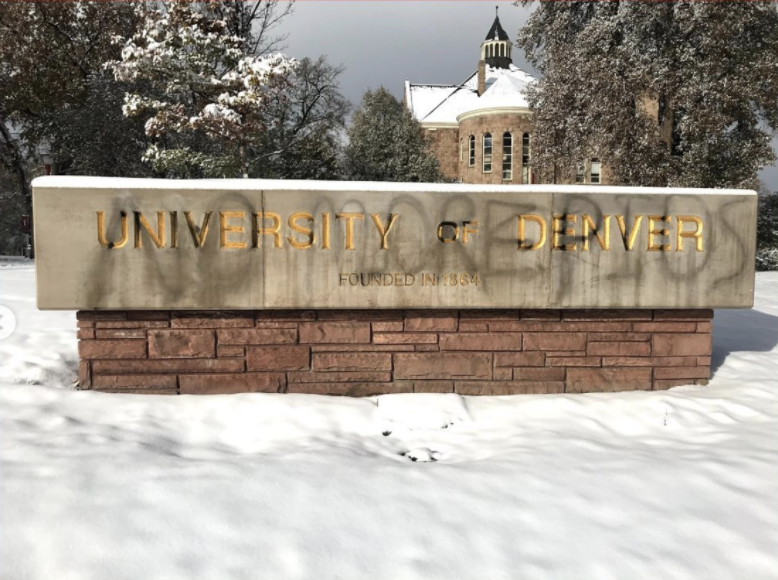Wednesday, Oct. 21—An hour before the Chancellor’s office planned to reaffirm DU’s ‘Pioneer’ moniker, Jeremy Haefner was on a Zoom call. He was trying to explain the decision to eight of its most vocal opponents first. He told them: “I know this decision does not make the issue go away. I know you will continue to demand this change.”
The students present in this call, organizers of a group known as “Righteous Anger! Healing Resistance!” (R.A.H.R.), would later describe his words as well-put and distinctly political.
The meeting was held almost a month after activists had gathered in support of #NoMorePios. The protest had been put together by R.A.H.R., who centered the action around seven demands that would provide healing and justice to Native communities as well as people of color.
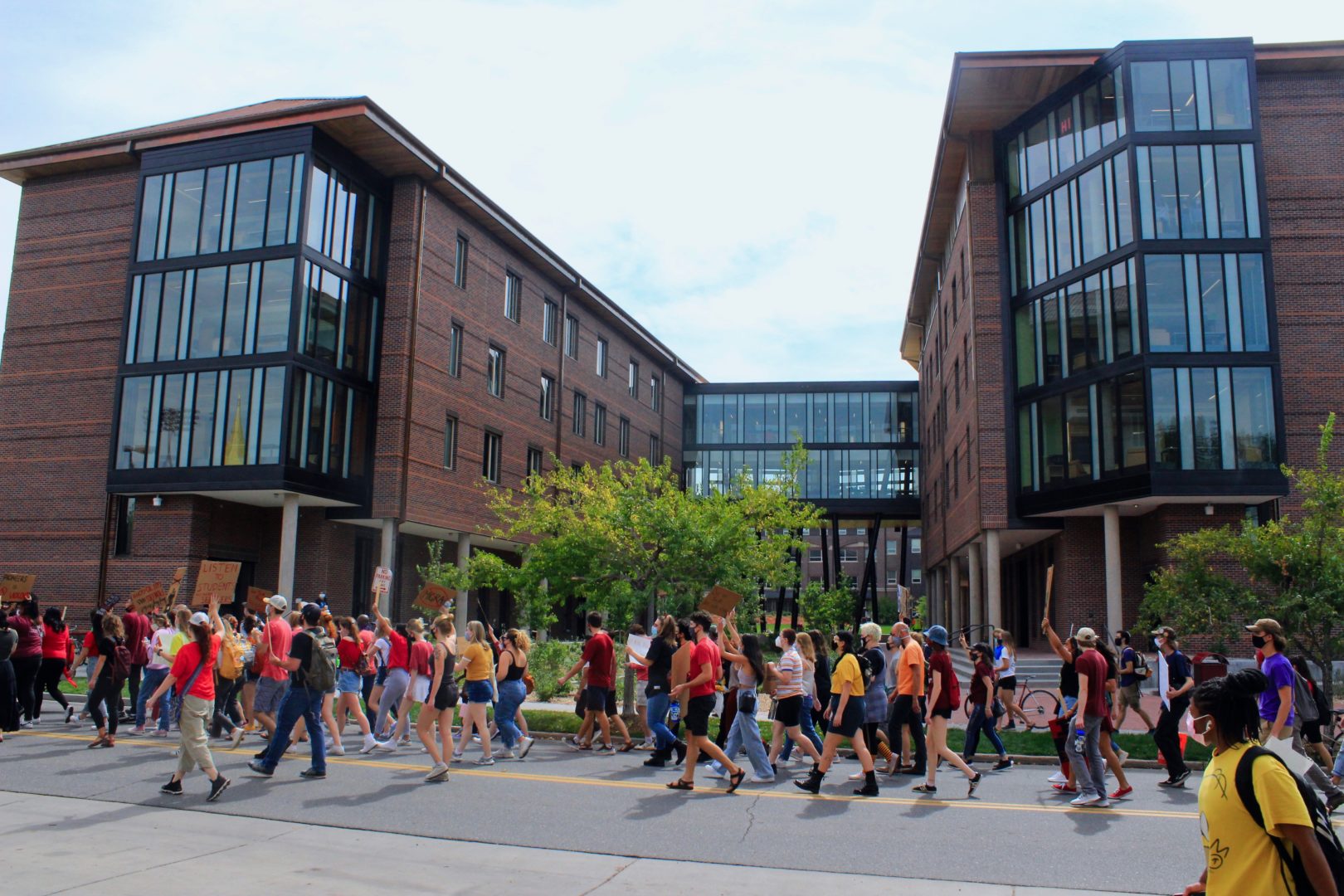
The Sept. 25 protest attracted a crowd of 200 people. Yet two weeks later, DU administration still had not released a response. Faced with silence, R.A.H.R. organizers reached out to Chancellor Haefner. They requested a meeting with him, one in which a representative from The Clarion could attend as a neutral figure. This representative would take notes, holding both parties accountable to their words on the record.
A day later, R.A.H.R. received a response. Haefner would meet. The student press, however, would not be allowed to be present. The Office of the Chancellor felt it would “change the dynamic” away from a “trusting, positive and productive conversation.”
For nearly two weeks, R.A.H.R. pushed to bring a Clarion representative. These efforts came to a halt when two days before DU’s response would be sent out to the school, the Chancellor brought forward a meeting time and date: Wednesday, Oct. 21 at 10 a.m. Organizers were not consulted about their availability. Instead, they were sent a Zoom link and an instruction—keep the school’s newspaper out of it.
“At one point in the meeting, he told us, ‘I understand the university has made a lot of statements we haven’t followed up on,’” recounts third-year and R.A.H.R. organizer Blake Nordstrom-Wehner. “Yet he did it again, and if a Clarion representative had been there, that would have been apparent. I don’t think he can afford to be held accountable.”
It would be 45 minutes long, and the organizers anticipated there would be time allotted for conversation after the Chancellor laid out his response. Instead, they received 40 minutes worth of Haefner’s talking points and five minutes for their own voices.
“We were very disappointed that we didn’t get much of a chance to speak,” said fourth-year and organizer Abdulrahman Ayad. “It was clear that he wanted to dictate the meeting on his terms. He used tactics to stall, elongating his points. He wanted to control the space.”
Caris Fox—a third-year and organizer—reiterated this point, saying, “The meeting felt inherently patronizing. He was retelling us the history of the word ‘Pioneer,’ even though we already knew and were familiar with it.”

The Chancellor used the time to provide explanations and justifications for the school’s response, the full contents of which can be found here. In this email sent to DU students, staff, faculty, parents and alumni alike, the university made a number of commitments before announcing its retained use of ‘Pioneer.’
The most notable include: (1) building a Critical Race and Ethnic Studies (CRES) major, (2) dedicating a memorial to the Cheyenne and Arapaho people, (3) creating a University-wide Center for Native American and Indigenous Studies, (4) providing full-tuition to undergraduate Native American students who qualify for need-based aid and (5) creating an exhibit on DU’s history with Native peoples for use in coursework and first-year orientation.
No timelines have been provided for these action items, and almost half of R.A.H.R.’s demands have been denied. This is the case for the sixth demand since DU will not divest from ties with ICE and other detention/correctional facilities. The same holds true for the seventh, as there are no open seats for students on the Board of Trustees. Most obviously, DU’s continued usage of ‘Pioneer’ dismisses the unifying principle behind R.A.H.R.
“We must use the contested definition of the Pioneer moniker to educate, learn and uncover why this word embodies both pain and pride,” the statement from the Chancellor reads. “In proceeding in this way, we aim to reclaim and define our moniker in ways that embody our current values and commitments.”
These commitments fall short of the expectations R.A.H.R. spelled out. Organizers emphasized that the university’s statement leans on suggestions already made by the 2014 John Evans report and fails to provide new initiatives that serve current Native students.
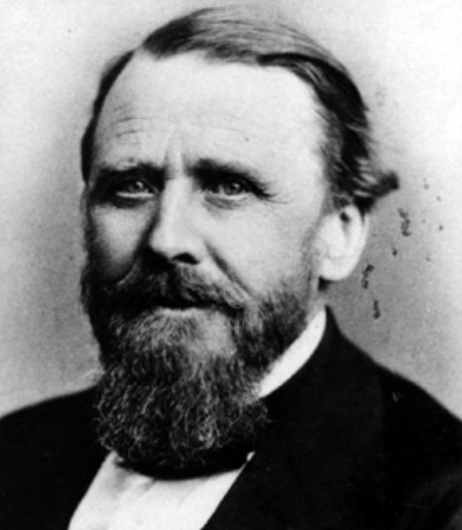
“These demands should have already been in the works and talked about with Native Student Alliance (NSA), staff and faculty present,” said third-year Taylor Lucero, president of NSA and R.A.H.R. organizer. “We have been absent from these conversations.”
While almost all of DU’s response left something to be desired among R.A.H.R’s organizers, it was DU’s embrace of ‘Pioneer’ that struck its community of supporters the most. Their interviews with The Clarion were rife with feelings of disappointment, anger and hurt.
“[The Chancellor’s] language conveys that he thinks the arguments for and against the Pioneer moniker are equal in weight and value,” said fourth-year Isaiah Jakab, one of the student protestors in Sept. “In the face of violence, they are saying the will of perpetrator and survivor should be taken into account equally. That shows a fundamental misunderstanding of R.A.H.R.’s demands and the brutal legacy of colonization, and it really disappoints me.”
“When the decision was made, I experienced emotions of disappointment and anger,” said Lucero. “Many of us have felt the emotional, mental and spiritual strain of the trauma DU continues to implement. There is nothing ‘inclusive’ or ‘diverse’ about taking pride in the ‘pioneering spirit.’”
“It surprised me how fiercely he defended the moniker,” said third-year Logan Ott, another R.A.H.R. protestor. “Oppressive groups cannot change the meaning of a word that is actively harming people, so the oppressor may feel at ease. This tactic has always been met with resistance, and this time is no different.”
Most interviewees attributed DU’s decision to maintain this name to those who hold the school’s financial pursestrings—alumni and the board of trustees. An alumni-run blog known as LetsGoDU rises in uproar every time student activists call for the name’s removal, running headlines such as “It is high time DU’s divisive faculty-led anti-Pioneer protests end” and “DU reaffirms Pioneers nickname, finally puts issue to bed.” Its comment section is rampant with those who protect and celebrate the moniker.
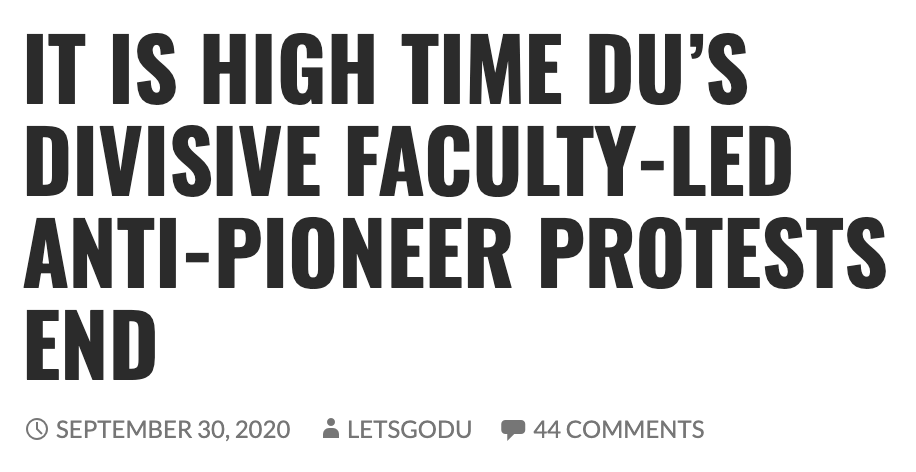
However, for some recent graduates, DU’s commitment to ‘Pioneers’ alienates. The 2019 and 2020 alumni with whom The Clarion spoke drew a direct connection between the school’s contentious identity and their choice to withhold further time, energy and resources from DU.
“The administration cares more about pandering to a select community of white donors than it does to listening and working to create change with their current students,” said Hannah Branit, a recent 2020 graduate. “Until DU shows that it is not exploiting its BIPOC population, I refuse to put energy or money back into the institution and what it represents.”
“It is not for settlers, non-Natives, to claim they are reappropriating a word that continues to harm Native people. It is not their decision,” said Grace Carson, a Native alumna from 2019. “DU as an institution will never have my support. They have caused an irreversible trauma and wound within myself and many other Native students.”
“It’s a profound disappointment that the University has changed very little since I graduated,” said Sarina Phu, who graduated with her B.A. in 2019 and M.A. in 2020. “I cannot in good conscience encourage other students, particularly students of color, to attend this university. Doing so would mean remaining complicit in the violence that the university perpetuates.”
Haefner was correct that his office’s decision would not phase or assuage the student organizers or their supporters. After DU’s response was made public, R.A.H.R. released this statement: “DU’s continued perpetuation of harm and failure to meet our demands is unacceptable, and we will not allow these actions to go unchecked.”
The following day, they posted a photo from a 1979 DU yearbook to Instagram with the hashtag #ThisIsWhatPioneeringLooksLike. For every week their demands are not met, R.A.H.R. intends to share another example of the “pioneering spirit” from DU archives.
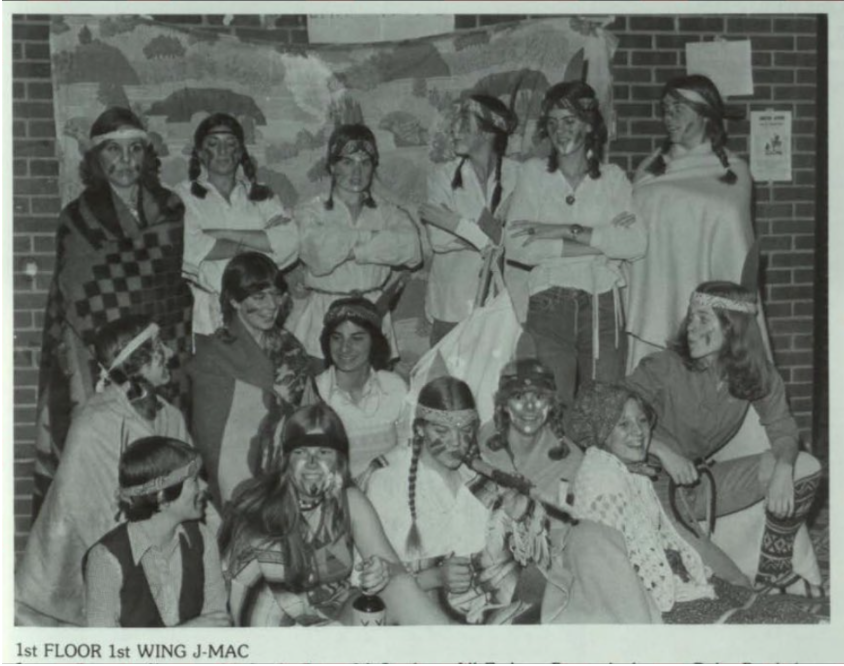
They have also launched a “Diversity Disappears” campaign that started on Monday, Oct. 26. Marginalized students and their allies are called upon not to participate in online classes and turn off their video and audio. They have changed their profile picture to read “No More Pios” and post a statement of solidarity in the Zoom chat of every class.
In the statement, students reinforce that, “The decision to neglect the demands has real repercussions for students who are already underrepresented on campus… The University of Denver cannot continue to tokenize these students in the name of ‘inclusive excellence.’ I will not be complicit in the harm perpetuated by this university.”
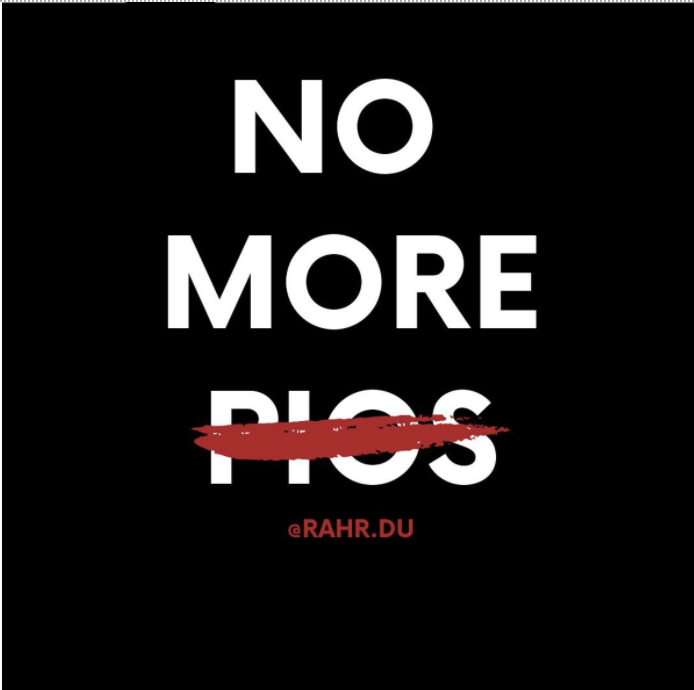
In the same vein as #ThisIsWhatPioneeringLooksLike, “Diversity Disappears” will continue until the university revisits R.A.H.R.’s demands. It has brought #NoMorePios into classroom spaces, forcing students and faculty across disciplines to face the outcomes of DU’s decision.
At DU, the Pioneer name and its removal have been in dispute for decades. As Haefner said himself, the university’s recent remarks will do little to change this.
A testament of this comes from Monday, Oct. 26, when an unknown person spray-painted one of DU’s signs. Over the gold letters, in black, they stated their cause—No More Pios.
Soon after, it was washed off. But traces of the message lingered, as some students’ words cannot be erased.
